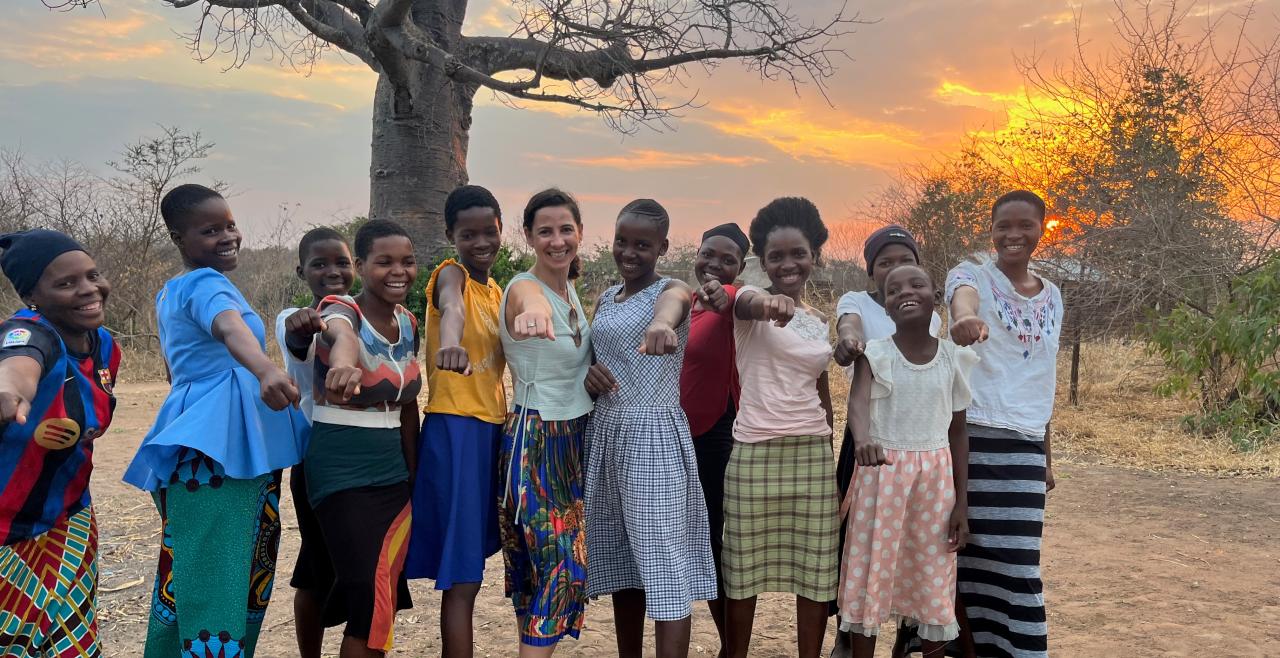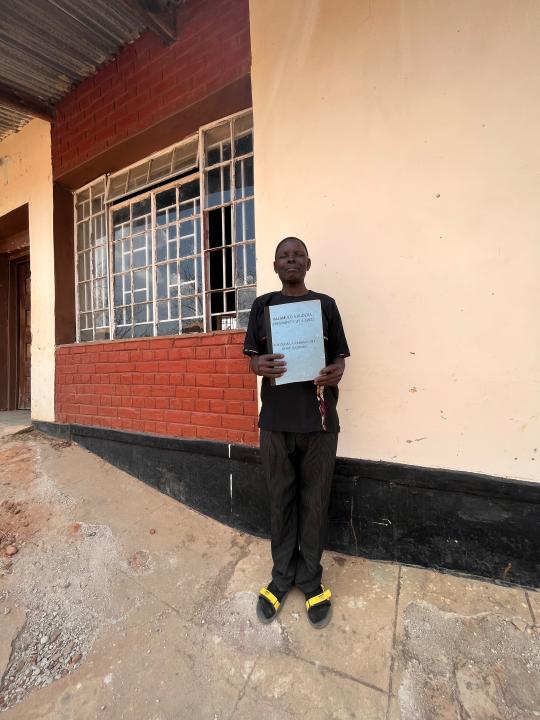A journey of transformation: Insights from country visits with Spotlight Initiative

By Mariana Servidio
Director of Operations and Impact Specialist at ImpactMapper
This post is a reflection of my learning journey during site visits to three diverse countries that were part of Spotlight Initiative: Malawi, Ecuador, and Trinidad and Tobago, as part of my work as an Impact Specialist and Director of Operations at ImpactMapper. The ImpactMapper team was commissioned by Spotlight Initiative to develop a Compendium of Innovative and Good Practices and Lessons Learned to ensure critical knowledge gained over the five years of implementation was shared on ending violence against women and girls (EVAWG). This work involved different methods of data collection (described in this previous post), including country visits. Through these country visits, I gained invaluable insights and experienced profound personal transformations, which I am eager to share with you. You will also find some practical tips on how to gather strong data from site visits based on my experience at the end of this post.
Country visits and my learning journey
My journey to Malawi, Ecuador, and Trinidad and Tobago opened my eyes to the profound impact of community-driven initiatives. As I set out to collect data from initiatives previously identified as good or innovative practices [1], my goal was clear: to gather data and understand what worked and did not to craft case studies and develop lessons learned that could inspire adaptation and replication elsewhere. This journey took me into the heart of communities, where I engaged with diverse stakeholders through interviews, focus groups, community gatherings and informal conversations, immersing myself in the daily lives of those striving for change to end violence against women and girls.
These visits offered multiple perspectives and firsthand insights into community challenges and achievements, highlighting local resilience and innovation. Through these immersive experiences, I was able to see Spotlight Initiative's impact beyond the numbers and reports, enhancing my professional skills and personal growth, and shaping my perspective and approach to social impact work. Each country uniquely contributed to my transformational journey, and I am excited to share some of my learnings with you below.
Malawi
One of the most inspiring aspects of my visit to Malawi was witnessing the shift in social norms and mindsets among key stakeholders and community members. This change was facilitated by a comprehensive approach adopted by Spotlight Initiative, including the early engagement with traditional leaders. By training and co-creating strategies with these influential actors, the Initiative resonated deeply within communities. Seeing traditional leaders, once skeptical, now spearheading efforts to engage local actors and community members in the fight for EVAWG was a testament to the power of co-creation strategies to drive social norm shifts.
Two stories from my visit stood out as powerful examples of how Spotlight Initiative challenged entrenched social norms. In the Machinga district, I met a traditional chief who proudly shared their by-law document. As he read the clause that prohibits marriage under the age of 18, his voice trembled with emotion—a reflection of his journey from past beliefs to becoming a champion for ending child marriage. His influence was palpable, and his commitment to driving change in his community was deeply moving.
Another unforgettable moment was visiting a Safe Space, where young women and girls gathered weekly to support each other and challenge harmful norms. As I arrived, I was greeted with joyful songs and dances. Under a tree, a 10-year-old girl shared a poem she had written. Her words spoke of newfound awareness and the transformative power of education—how it had shifted her perspective from reliance on marriage to embracing education as a path to empowerment and agency.
These stories taught me that changing beliefs and mindsets is possible when communities are given the space to grow, learn and find common ground. It requires time, trust and open dialogue, but the results are profound. The resilience and courage I witnessed in Malawi inspired me to believe that even the most entrenched norms can be transformed.
- Read the full case study 7.1 on Malawi's comprehensive approach here.
- Read the full case study 2.3 on engaging traditional leaders in Malawi here.
- Read the full case study 3.1 on the Safe Space Mentorship Programme in Malawi here.
Ecuador
Ecuador was another important chapter in my journey with Spotlight Initiative, offering insights into how multi-stakeholder, participatory approaches can catalyze outcomes beyond those expected by a given initiative. This was the case with the Femicide Reparation Policy proposal. The multi-stakeholder approach and participatory process adopted for its development ended up supporting the strengthening of networks, leading to the creation of women's movements advocating for the implementation of this policy and other policy reform initiatives. This allowed a significant number of mothers of femicide victims to join efforts and be heard in other policy-making processes.
One story that deeply touched me was meeting the mother of a femicide victim. Our conversation began gently, with her sharing memories of her daughter's childhood, her love for life and her caring nature. This process of honoring her daughter's life fostered a connection and trust between us, allowing her to share her long and arduous fight for justice and reparation, first by herself, and later as part of women's movements. Her strength and courage to "transform every tear into a cry of protest," as she powerfully put it, moved me profoundly. This brave mother exemplified the human capacity for resilience and persistence, even under unbearable pain. Her story taught me about the indomitable spirit of those who continue to fight for justice and change, inspiring me to carry her message forward in my work.
- Read the full case study 1.2 on Ecuador's Femicide Reparation Policy here.
Trinidad and Tobago
My visit to Trinidad and Tobago illuminated the transformative approach of empowering local institutions to spearhead change. In a country with high rates of lethal femicides, the need for a robust and responsive law enforcement system was clear. The "training of trainers" approach adopted by Spotlight Initiative emerged as a strategy that not only enhanced the knowledge and capacity of police officers but fostered a sustainable and resilient response to gender-based violence. By entrusting local officers to lead their peers, this initiative harnessed the strength of community bonds, ensuring that the lessons learned would resonate deeply and endure.
An unforgettable encounter during my visit was with a police officer who had volunteered to become a trainer. In an informal conversation, she revealed her own journey as a survivor of intimate partner violence. Her story was a reminder that even those tasked with protecting others are not immune from experiencing abuse. Yet, it was her courage and determination to transform her personal pain into a source of strength that truly inspired me. By joining the training programme, she sought not only to uplift support to other survivors but also to embark on a personal path of healing and empowerment.
- Read the full case study 4.13 on Gender Responsive Policing Training in Trinidad and Tobago here.
Spotlight Initiative underscored the transformative power of community-driven initiatives and collaboration. Empowering local leaders, fostering participatory approaches and building resilient institutions are vital to reshaping entrenched social norms and driving sustainable change. The courage and resilience of those I met inspired me to persist in contributing to a world where every individual can thrive and lead transformative change in their communities.
Tips and Lessons for Gathering Strong Data from Site Visits
The success of a site visit depends on the ability to gather robust and meaningful data that can illuminate results and inform lessons learned. In this section, I will share practical tips and insights from my own experiences to help you maximize the value of your site visits.
Tip 1: Prepare Thoroughly Before the Visit
- Research and Contextual Understanding: Familiarize yourself with the local context, programme objectives and key stakeholders, their roles and organizations. This preparation will help tailor your data collection approach and ensure relevance.
- Define Clear Objectives: Establish specific goals for what you aim to achieve with the data collection. This clarity will guide your interactions and focus your efforts on gathering pertinent information.
Tip 2: Build a Balanced Agenda
- Realistic Planning: Develop an agenda that balances structure with flexibility, allowing room for referrals and unexpected opportunities.
Tip 3: Prioritize Safety and Wellbeing
- Safety Considerations: Learn about the safety levels in each country you will visit and organize your itinerary accordingly to ensure your safety and wellbeing, as well as the safety and wellbeing of those you interview.
- Emotional Resilience: Acknowledge that you may encounter challenging situations that trigger strong emotions. Allocate time to process these experiences and prioritize self-care.
Tip 3: Use a Mix of Data Collection Methods
- Interviews and Focus Groups: Conduct structured interviews and focus groups with stakeholders to gather diverse perspectives. Prepare open-ended questions that encourage detailed responses. Be open to referrals from interviewed stakeholders, as they can provide access to key perspectives you might not have anticipated.
- Observations: Spend time observing the programme in action. Note interactions, behaviours and environmental factors that may not be captured through interviews alone.
- Community Engagement: Engage with community members through informal conversations and gatherings to gain insights into the programme's real-world impact.
Tip 4: Build trust and connection
- Cultural Sensitivity: Approach interactions with cultural awareness and respect. Building trust with participants will lead to more honest and open sharing of information.
- Active Listening: Demonstrate a genuine interest in participants' stories and perspectives. This approach not only enriches the data but also strengthens relationships.
Tip 5: Triangulate Data Sources
- Cross-Verification: Compare information from different sources to validate findings and ensure accuracy. Triangulation helps in identifying consistent patterns and discrepancies.
- Diverse Stakeholder Input: Involve a wide range of stakeholders, including those served by the programme, implementers and policymakers to capture a comprehensive view of impact.
Tip 6: Document and Analyze Data Systematically
- Detailed Documentation: Take notes and record your interactions when consented to by interviewees. This practice ensures accuracy and guarantees that no detail is overlooked. Recording transcriptions can then be used for data analysis.
- Thematic Analysis: Organize data into themes and patterns that emerge from your findings. This structured approach will aid in drawing meaningful conclusions and lessons learned. You can use a software tool like ImpactMapper to code, analyze, and visualize qualitative data according to your unique outcomes or themes and collect original data through surveys.


